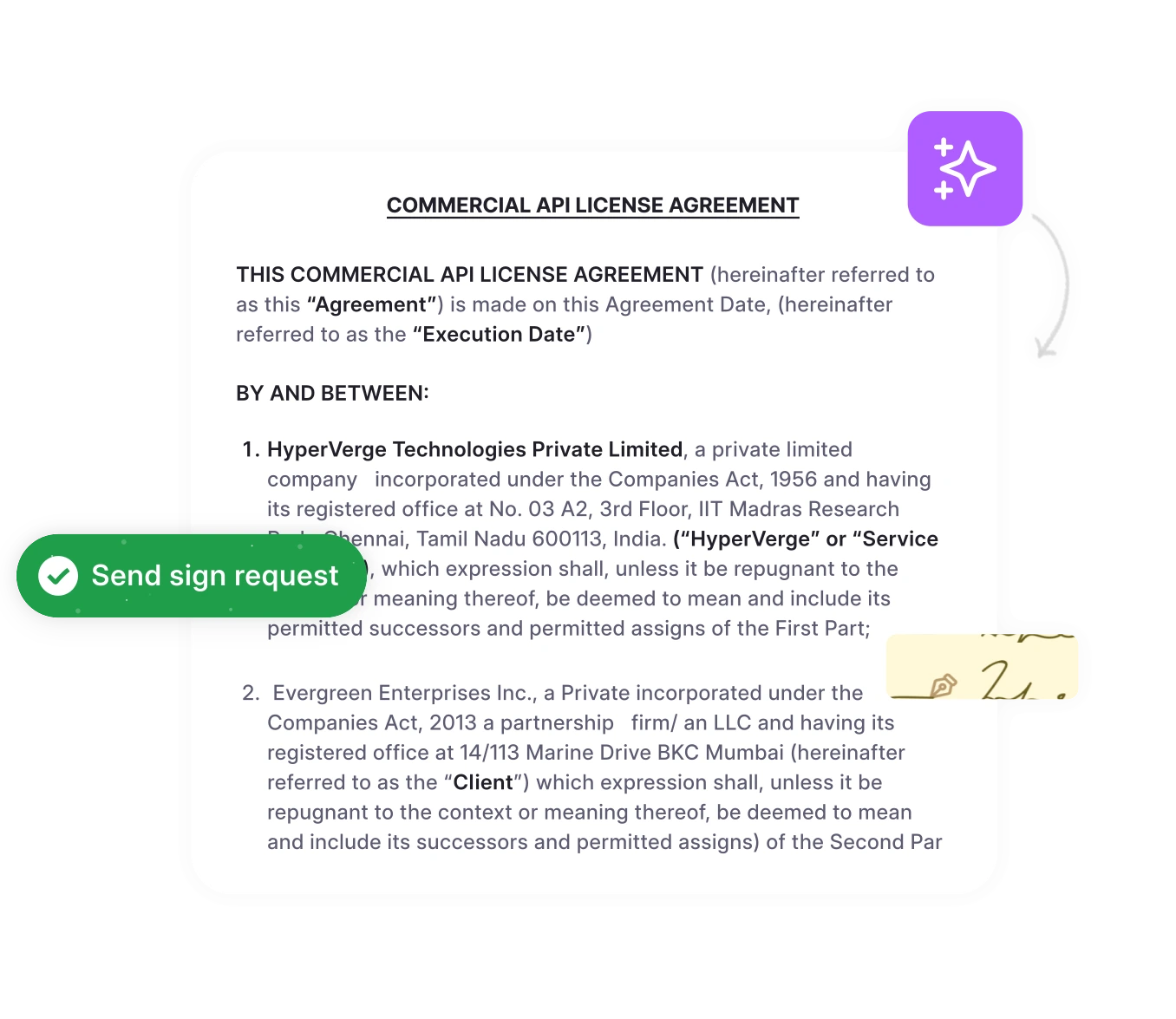Every contract needs a clear finish line–the termination date. Let’s break down why this single date is so critical for making the final payment, managing risk, and ending relationships smoothly.
So, what is a termination date?
The termination date is when all active obligations officially cease under a contract, except for special provisions that outlive the agreement itself, like confidentiality clauses or indemnification requirements.
The termination date creates a legal boundary that determines when parties are no longer bound to perform their primary obligations. It essentially prevents graveyard contracts.
Why does a defined termination date matter?
The termination date marks the certainty of the natural ending of a business relationship. As Sterling Miller points out, if a contract terminates on the 21st, does that mean midnight when the 20th becomes the 21st, or midnight when the 21st becomes the 22nd? And under what circumstances can it be extended or terminated early?
The solution? Be specific. State something like “this agreement terminates at 11:59 pm Central Standard Time on October 21st, 2025.” This way, the time and date of the action are crystal clear, leaving no room for interpretation or disagreement.
For legal teams, a well-defined termination date means you plan––whether that’s transitioning to a new vendor, prepping for renewal negotiations, or making sure no one owes anyone anything when closing out.
Read: Contract Termination Guide: Process & Best Practices
Tired of unclear contract endings?
Auto-track every termination date and auto-renewal so you’re never caught by surprise.
Book a DemoCommon places you’ll find a termination date
Without the termination clause, you risk perpetual obligations, unclear liabilities, and messy exits that could have been avoided with a single, well-drafted clause. Here’s where you’ll usually find them.
1. Your employment contract
Employment agreements include termination provisions and notice provisions. They look different depending on whether you’re at-will or working under a fixed-term contract.
A standard employment contract might state that either party can terminate the agreement with 30 days’ written notice. This timeline helps both employers and employees manage transitions.
2. In non-disclosure agreements (NDAs)
An NDA might have a termination date, but the confidentiality obligations don’t necessarily end on that date. They usually survive termination for a specified period, sometimes for years or even indefinitely for trade secrets.
The duration of contract obligations depends on factors like the pace of technological change and whether the information qualifies as a trade secret determines how long protection should last. This is why the survival clause in an NDA is just as important.
3. In vendor and client service agreements
These are best for software subscriptions, consulting arrangements, or maintenance contracts that often include auto-renewal clauses buried in the fine print.
Read: A Guide to Evergreen Contracts
Your contract might state a termination date of December 31, 2025, but include language that automatically renews for another year unless you provide 60 days’ notice before that date. You’re locked in for another term if you miss that window. This is one of the most common pain points for legal and procurement teams managing multiple vendor relationships.
Types of termination
Termination for convenience
Termination for convenience allows either party to end the contract by giving notice before a certain date, without needing to prove breach. It’s a planned exit negotiated carefully and baked into the agreement.
For legal teams, termination for convenience provisions offer flexibility. Notice periods must ensure that your organization has enough time to find alternatives without disrupting operations.
Termination for cause
Termination for cause happens when one party materially breaches the contract, such as failing to pay or breaching a contract. This type usually allows for immediate or accelerated termination. This scenario often kicks in immediately upon notice or after a short cure period (typically 15-30 days) if the breach can be fixed.
For instance, if a vendor consistently misses delivery deadlines after being notified, the client can terminate for cause without the standard notice period.
Finding middle ground: Suspension as an alternative
Before jumping straight to termination for cause, consider suspension as a potential remedy. Suspension should only be used when necessary under the circumstances or as a preferred alternative to full contract termination.
Termination for convenience vs. Termination for cause
| Termination for Convenience | Termination for Cause | |
| Breach | No breach required—either party can exit | Requires a material breach of contract |
| Notice | Requires advance notice (30-90 days typical) | Often immediate or short cure period (15-30 days) |
| Penalty | May require payment for work completed | May include penalties or withheld payments |
How to manage a fair termination date
Be clear
Avoid vague language like “end of Q4” or “upon project completion.” Instead, use specific dates like “December 31, 2024” or clear triggers like “30 days after written notice is received by both parties.” Build in objective criteria for contracts where the end date depends on performance milestones.
Align with the business
The termination date should reflect how the business actually works. For project-based work, it should come after final deliverables are accepted and payment is processed. For subscription services, it should align with billing cycles to avoid conflict over partial refunds.
Consider whether rights to terminate or modify the contract should be included in the event of force majeure events. But that should typically be proportionate to the impacted obligations.
The survival clause and final payment
Terminating a contract does not automatically end all rights and obligations. Drafters must proactively specify which terms will continue after termination.
Key Points:
- The Problem: General termination may not revoke specific rights granted to third parties (like a customer’s right to access a free sample, as in the Smith v. Barnesandnoble.com case).
- The Solution: When drafting a contract, carefully consider and explicitly state which rights and obligations will “survive” termination.
Drafting Lesson: Always include a “Survival” clause that clearly lists the sections of the agreement: indemnification, confidentiality, and intellectual property licenses. Critical protections must be pre-defined so you’re not exposed to risks the moment the contract ends.
Read
Common provisions that should survive include:
- Confidentiality obligations
- Indemnification
- Intellectual property licenses
- Payment obligations
- Dispute resolution
- Limitation of liability
When drafting, specify how long these provisions survive. For example: “The confidentiality obligations in Section 7 shall survive termination for a period of five (5) years from the termination date.”
Streamline your contract management
Let us help you automate reminders and manage critical dates, giving your legal team time to focus on what matters.
Book a DemoTermination dates across industries
The concept works the same way everywhere, but the stakes vary:
- Healthcare: You can’t just walk away mid-patient-care. Termination dates must account for continuity of care and regulatory compliance that often survives for years.
- Insurance: Termination dates(sometimes called”expiration dates”) define coverage periods. Mess this up, and you might have gaps in coverage.
- Freight and Logistics: Transportation agreements often include”termination assistance” for smooth handoffs and supply chain operations.
- Construction: Termination dates tie into project milestones with provisions about payment if you terminate mid-project.
- Oil & Gas/Energy: When predetermined prices do not work, the provision addresses regulatory changes and fluctuations.
- Real Estate: Lease and rental agreements use termination dates with automatic renewals and specific notice requirements.
- Government: Federal contracts have standardized termination procedures under FAR, with specific rules about termination for convenience versus default.
- Nonprofit: Grant agreements include termination dates tied to milestones, deliverables, and funding cycles.
- Education: Academic partnerships align termination dates with academic calendars and enrollment periods.
Your quick checklist for managing termination dates
The goal of termination assistance is to secure business continuity by making any transition as seamless as possible. The assistance should enable you to take over services directly or obtain them through a replacement provider in an orderly fashion. Use this checklist to ensure you’re managing termination dates professionally:
Frequently asked questions
In short: Expiration is the planned finish line. Termination is an early exit strategy.
- General business info like client lists or strategies is typically protected for 2 to 5 years after the contract ends.
- True trade secrets like the recipe for Coca-Cola can last indefinitely, for as long as that information remains a secret.
So, the NDA itself might terminate, but your duty to keep information under wraps remains.
In which case, it's a good idea to amend it and add one to protect everyone involved and provide a clear path forward.












